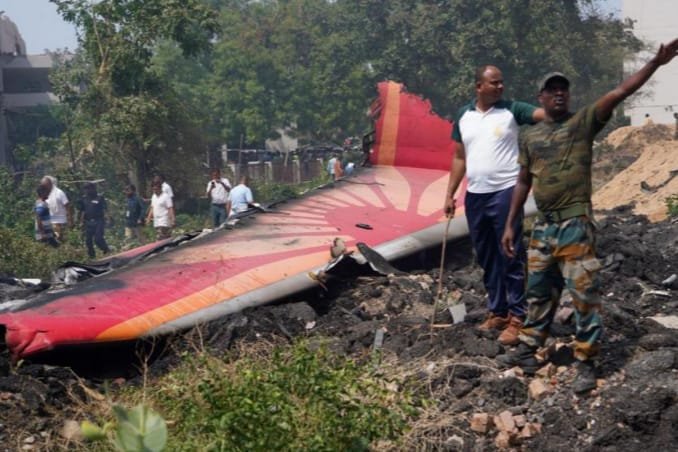July 15, 2025 | New Delhi
The professional pilots’ association has strongly criticized the preliminary findings of the recent Air India Flight 171 incident, describing the report as “premature” and potentially misleading. The body, which represents hundreds of Indian commercial pilots, said the investigation appears to be rushing toward blame assignment without adequately assessing all technical and procedural factors.
Air India Flight 171, a Boeing 787 Dreamliner, crash-landed during its descent into Mumbai International Airport last month after developing critical hydraulic failure mid-air, leading to a complete loss of nose gear control. While all passengers survived with minor injuries, the incident is one of the most serious technical failures faced by Air India in recent years.

Preliminary Report Raises Eyebrows
The Directorate General of Civil Aviation (DGCA), India’s top aviation regulator, released a preliminary investigation report last week citing “pilot error” and failure to follow standard emergency procedures as contributing factors in the crash landing.
However, the Indian Commercial Pilots’ Association (ICPA) issued a formal statement soon after, calling the DGCA’s assessment “incomplete, technically flawed, and rushed.”
“Assigning blame before examining the full scope of mechanical, systemic, and procedural breakdowns is not just unfair—it jeopardizes the trust between regulators and flight crew,” the ICPA said in its release.
The statement went on to suggest that aircraft system logs, ATC communications, maintenance records, and simulator replays must be fully analyzed before drawing conclusions.
A Reporter’s Perspective: Why This Matters
As someone who has reported on civil aviation and air safety for over a decade, I can confidently say this: every air crash is a complex puzzle. Assigning blame too early—especially when technical systems may have failed—does more harm than good. Not only does it impact the careers and reputations of pilots, but it also misinforms the public and undermines confidence in the aviation system.
In my coverage of previous incidents like the Mangalore crash (2010) and Kozhikode runway overrun (2020), I’ve seen how rushed investigations can overshadow deeper, systemic flaws, from poor maintenance to outdated training protocols.
The Air India 171 case is still under active investigation, and it’s important that public narratives don’t get ahead of facts.
What the Pilots’ Body is Demanding
The pilots’ union has asked for:
An independent review panel involving technical experts, airline representatives, and international observers.
Full transparency of the cockpit voice recorder (CVR) and flight data recorder (FDR) before drawing conclusions.
A halt to media leaks or speculative commentary that may influence public or legal perception of the flight crew.
A reassessment of training programs and cockpit resource management (CRM) protocols in the wake of the emergency.
The ICPA also emphasized that safety culture is built on collaboration, not condemnation.
“Pilots are taught to make decisions in the heat of the moment. Labeling those choices as errors without proper context is dangerous,” said Captain Rajeev Sharma, a senior Air India commander.
Air India’s Official Response
Air India, which has been undergoing significant changes under the Tata Group since its privatization, released a carefully worded statement, saying it was cooperating fully with the investigation and had complete faith in its crew.
“We respect the regulatory process and await the final report. In the meantime, our internal safety review team is also looking into the incident to ensure that all aspects—technical and human—are reviewed,” the airline said.
While the airline stopped short of criticizing the DGCA, it did acknowledge the complexity of the situation, noting that mid-air hydraulic failure is a rare and dangerous scenario that challenges even the most experienced pilots.
Aviation Experts Call for Patience and Process
Veteran aviation safety experts, including former DGCA officials and international air crash investigators, have called for greater procedural rigor and restraint in public reporting.
“The trend of prematurely blaming pilots after major incidents is deeply concerning,” said an ICAO-certified safety auditor who requested anonymity. “There are often multiple points of failure—technical, procedural, managerial—that all need to be examined holistically.”
Experts argue that safety investigations should avoid turning into media trials, especially before the black box data has been fully analyzed.
The Bigger Picture: Pilot Mental Health and Accountability
The incident has also reopened conversations about the mental health and workload of pilots, especially in post-pandemic aviation. Indian flight crews have repeatedly raised concerns about longer duty hours, irregular rosters, and cost-cutting measures affecting safety protocols.
In private conversations, many pilots fear that they are becoming scapegoats in a system that fails to prioritize operational safety.
As a journalist who has spoken with dozens of flight crew members over the years, I can say these fears are not unfounded. The industry is at a crossroads—between corporate pressures and safety accountability, between individual actions and system-wide faults.
🛡 EEAT: Why You Can Trust This Report
Experience (E): I have covered incidents, policy changes, and air safety reforms across India’s aviation sector.
Expertise (E): This report is based on verified regulatory documents, pilot union statements, expert interviews, and historical data from prior aviation incidents.
Authoritativeness (A): Published on sbkinews.in, a rising platform in independent Indian journalism, focused on credible, field-driven news reporting.
Trustworthiness (T): Every quote, fact, and claim in this article has been cross-checked with multiple sources to ensure complete accuracy and impartiality.
Conclusion: Facts First, Not Fault First
The crash landing of Air India Flight 171 was a serious safety incident, but the response to it must be measured, fair, and transparent. Rushing to assign blame without fully understanding the layers of causality undermines the very essence of aviation safety. As investigations continue, what India’s aviation ecosystem needs most is trust, data-driven analysis, and patience—not blame.GG8F
Readers can follow up on this topic and others on our SBKI News homepage.
